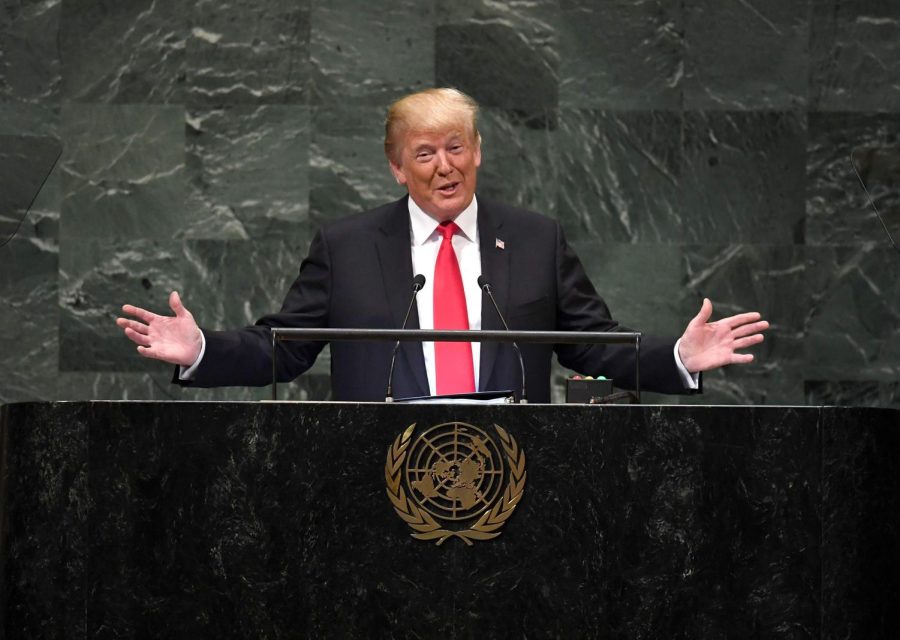American politics are “critical” on the world stage, according to Professor Angelika von Wahl, chairwoman of the International Affairs Program and moderator of last week’s panel entitled “The Impact of US Elections on Global Politics.”
The panel was composed of professors Ilan Peleg, Seo-Hyun Park, Christopher Lee, Hannah Stewart-Gambino and Mathieu Perrot, each of whom discussed a different facet of America’s involvement in global politics and how the outcome of the election will affect them.
“There have been many important elections in the past,” Peleg, a member of the Government and Law department, said. “I think that this particular election…really will determine the role of the United States in the world for many years–and possibly generations–to come.”
He argued that there is no longer a bipartisan consensus on the role America should play in the world and how president Trump has worked to widen the divide between the two major parties, noting that Trump’s 2016 campaign slogan, “Make America Great Again,” implies “the end of [American] internationalist commitment.”
Peleg continued, explaining how unilateralism has dominated US foreign policy, breaking with the norms of past administrations and isolating America on issues of climate change, arms control and trade. Furthermore, he said that international institutions have been either demoted in importance or abandoned by the Trump administration and that the United States no longer promotes its values around the world.
“[This] election is about one thing and one thing alone,” Peleg said. “Restoration.”
Park, also a Government and Law professor, discussed the effect the election could have with respect to regional security in East Asia.
“Many of the problems that we saw throughout the Trump administration, as they relate to East Asian issues, were not new problems,” Park said. “The combination of the administration’s policies with the pandemic have accelerated, or made more explicit, some of these foreign policy issues.”
Park criticized Trump’s unashamed recognition of Taiwan, an island nation home to defectors of mainland China, for openly recognizing its sovereignty and selling larger amounts of weapons.
“It’s not factually wrong,” Park clarified. “But the consequence of his actions was to break apart the longstanding policy of the US: to maintain a strategically ambiguous position.”
This resulted in sanctions by the Chinese government against American arms manufacturers.
“A third area where we’ve seen a lot of banter between the US and China is over the South China Sea,” Park continued.
Pointing to a map of the area, Park explained that China’s claims to small islands in the South China Sea have led to conflict with other nations in the region. In response, the Trump administration sent aircraft carriers to the area, and Park said that such an action might further raise tensions between the United States and China.
In addition to the aircraft carriers, America has a continuous military presence in East Asia, and President Trump has expressed a desire to expand that presence. Additionally, Trump has been attacking allies in this area, leading regional allies to begin to see America as “an unreliable ally.”
Park then went on to point out that the United State’s withdrawal from the Trans-Pacific Partnership (TPP) led to China increasing its presence and influence in America’s absence.
“Without American participation,” argued Park, “the US no longer has institutional leverage. It can demand things of China, but without being in that institution, it cannot enforce its rules.”
Echoing Peleg’s theme of restoration, Park concluded that the upcoming election will decide whether the United States can return to its former authoritative position in East Asia or continue conceding ground to China.
Lee, a history professor, agreed with Park’s sentiment that America was beginning to fall behind China, especially in the scope of Sub-Saharan Africa. He stated that although the Trump administration has continued its military presence there that began in the early 2000s, China has built up infrastructure in the region that the US has yet to compete with. Channeling Peleg’s idea that the United States has failed to promote ideals of freedom and democracy, Lee detailed Trump’s tendency to cozy up to authoritarian leaders.
“I think that the fact that the United States…has moved away from some of its principles has emboldened certain African leaders to embrace a disregard for human rights concerns,” Lee said, citing unrest in Nigeria due to recent killings by the Special Anti-Robbery Squad (SARS). “There has been a lack of international supervision or pressure on certain governments to follow through with certain reforms.”
“The Trump administration has not presented a role model,” Lee concluded. “This election is an opportunity to change that.”
Stewart-Gambino, International Affairs professor, compared America’s pre-Trump approach in Africa to that of Latin America. She noted that there was general bipartisan consensus in regards to foreign policy in both these regions, and that the United States has historically had a “harder” military approach in South America because its affairs are “key to the US’s economic interests.”
Alluding to the historically bipartisan approach to Latin America, Stewart-Gambino stated that despite the broad similarities she saw between Trump’s approach to Latin America and that of a possible Biden presidency, there are key differences between the two, namely with regards to immigration, human rights, regional democracy and climate.
A Biden administration, argued Stewart-Gambino, would take a softer approach to immigration, ending child separation, extending Temporary Protected Status to more Latin Americans, expand aid to Latin American countries to prevent the need to immigrate to America and ease restrictions on visas and asylum seekers.
Stewart-Gambino proposed that where Trump “disregarded” Latin American countries, Biden would place a greater emphasis on them, most notably by rejoining the Pan American Health Organization. Additionally, a Biden administration would push for more democracy in Latin America, especially in light of recent vulnerabilities created by the COVID-19 pandemic, by tying aid money to anti-corruption and election monitoring.
“Where we might expect some of the sharpest differences [between Trump and Biden]…is on climate,” Stewart-Gambino said, highlighting Biden’s opposition to anti-climate policies like the deforestation of the Amazon rainforest endorsed by Brazillian President Jair Bolsonaro, who is often referred to as “the Trump of the tropics,” as a key distinction between him and the current President.
Trump’s approach to Latin America, concluded Stewart-Gambino, “is both foolhardy and shortsighted and is extraordinarily misguided.”
Perrot, Foreign Languages and Literatures professor, compared the opposing approaches to climate policy examining how Trump abruptly severed the US from the Paris Climate accord, which Biden has said he would promptly rejoin.
“If you watched the debates,” Peleg told The Lafayette after the panel, “the debates did not deal with foreign policy.”
“The role of the United States in the world, today, is very very important–probably more important than any other single country,” continued Peleg. “Foreign policy decisions will really shape over the world tomorrow.”






































































































